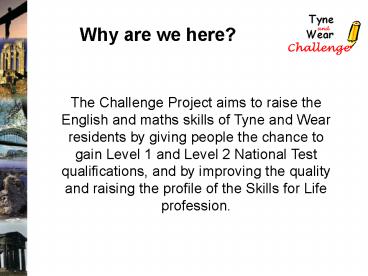Why are we here - PowerPoint PPT Presentation
1 / 18
Title:
Why are we here
Description:
... the English and maths skills of Tyne and Wear residents by giving people the ... To give a supportive context for the PLUS Strategy in Tyne and Wear. Respect ... – PowerPoint PPT presentation
Number of Views:92
Avg rating:3.0/5.0
Title: Why are we here
1
Why are we here?
The Challenge Project aims to raise the English
and maths skills of Tyne and Wear residents by
giving people the chance to gain Level 1 and
Level 2 National Test qualifications, and by
improving the quality and raising the profile of
the Skills for Life profession.
2
Why are we here?
- To raise the profile of the Skills for Life
agenda in the wider FE sector - To experiment with recruitment methods and
communicate our findings to providers - To give a supportive context for the PLUS
Strategy in Tyne and Wear.
3
Respect
- We will treat all participants in the project
with respect. We aim to provide equality of
opportunity for all learners regardless of the
diversity of their individual backgrounds and
needs, where they are recruited and the provider
at which they attend.
4
Respect
- We will actively engage communities across Tyne
and Wear ensuring all residents have equal access
to the project - We will treat everyone we are in contact with
equally regardless of age, race, gender,
disability or sexual orientation - All our policies and processes will be fair and
transparent.
5
Partnerships
- Effective partnership working is vital to the
success of the project.
6
Partnerships
- We will build robust partnerships with all
stakeholders - We will be consistent in our approach to
partnership working - We will benefit from the knowledge of others
- We will deploy resources efficiently and
effectively - We will influence Skills for Life practitioners
and Skills for Life delivery both during and
after the lifetime of the project.
7
A Professionalised Workforce
- The project is committed to upskilling the
workforce across a range of levels. We are as
dedicated to raising the professional aptitude of
all staff involved in the Skills for Life sector
as we are to empowering learners.
8
A Professionalised Workforce
- National Test
- Bespoke training events
- Level 3 and Level 4 Literacy and Numeracy subject
specialist courses - Project staff
- Short-course training.
9
Promote the benefits of Skills for Life
qualifications
- The National Test qualifications carry huge
benefits for individual learners, their families,
employers and the economy.
10
Promote the benefits of Skills for Life
qualifications
- Proactive recruitment
- Imaginative marketing
- Networking with partners
- Contribution to relevant events and conferences.
11
Challenging the silo mentality
- The project will apply the techniques, knowledge
and experience of other professions to the Skills
for Life sector.
12
Challenging the silo mentality
- Break new ground in recruitment practice
- Employ skilled project staff with experience from
a wealth of different arenas, including the
corporate sector - Learn from the experience of the national project
Move On - Act as a model of good practice for similar
Skills for Life projects, including Test the
Toon and Test the County - Disseminate models of recruitment with potential
learners in the region.
13
What do we call success?
- Success will be measured both quantitatively and
qualitatively.
14
What do we call success?
- Meet all targets specified in the bid document
- The Skills for Life Community accept innovative
ways of recruiting as a viable option - Produce qualitative data about the learners
experiences - Learning Partnerships are fully informed about
the lessons learnt and information gained from
the Challenge Project - 360 feedback.
15
We are committed to learner success
- We will support our learners to achieve their
qualifications and as part of this have a
commitment to their retention. This commitment
extends both to National Test learners and to
those undertaking practitioner training.
16
We are committed to learner success
- We will work with providers to support our
learners to attend provision and to achieve
qualifications - We will work with providers to deliver a suitable
learning environment to our learners - We will establish effective systems to produce
accurate information.
17
Exit Strategy
- We have a responsibility to prepare our staff
for the end of the project. We will do all we can
to support them in their immediate career
progression. - The Challenge Project aims to leave behind a
legacy of experience which can inform future
recruitment of Skills for Life learners, employer
liaison and continuing development for Skills for
Life professionals.
18
Exit Strategy
- Promote CPD opportunities for our staff
- Produce a thorough project evaluation to be
circulated to all funders, learning partnerships,
providers and other interested parties - Feed in our experiences to learning partnerships
- Encourage provider networks and other groups to
continue after the end of our project - Legacy of experience which will inform a
sustainable framework of good practice.































